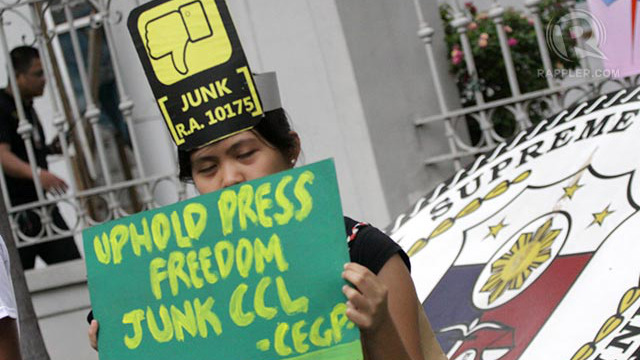SUMMARY
This is AI generated summarization, which may have errors. For context, always refer to the full article.

MANILA, Philippines – Another magistrate of the High Court will pen the new decision on the Cybercrime Prevention Act of 2012 – should the appeals for review be granted, sparking hopes for certain quarters still assailing the law.
Justice Roberto Abad authored the Supreme Court (SC) decision released February 2014 declaring constitutional most provisions of the cybercrime law. (READ: SC rules online libel constitutional)
Abad is set to leave the High Court on May 22 when he hits the retirement age of 70, making it unlikely for him to author the new ruling if bids to reconsider are granted.
“We hope the new ponente (author) would advocate greater Internet freedom and protection for Internet users,” said Kabataan Partylist Rep Terry Ridon on Thursday, March 13.
In the February ruling penned by Abad, the SC in a 12-2-1 split decided in favor of criminalizing online libel when it comes to the original author of an online post.
In a matter of 3 days mid-March, various groups – including youth leaders, lawyers, bloggers and netizens, journalists, and leftist activists – appealed before the SC to have its ruling reviewed.
“Criminal libel has no place in the modern world, and we clearly hope the new ponente would deal (with) a fatal legal blow against it as the SC revisits its cybercrime decision,” Ridon added, whose group was the first to file a motion for reconsideration (MR).
MRs filed
The Center for International Law (Centerlaw) on Thursday also filed a motion for partial reconsideration challenging both the constitutionality of online libel and the criminal nature of libel in the Philippines.
“We’re hoping that our MR will give the new ponente new insights on the intricacies of our arguments,” said lawyer Harry Roque, Centerlaw’s Chairperson, after the filing.
The National Union of Journalists of the Philippines, the Bayan Muna Party-list and the Bagong Alyansang Makabayan (Bayan), the Bloggers and Netizens for Democracy (BAND), and the Philippine Bar Association filed MRs on Wednesday, March 12.
All wanting the cybercrime ruling overturned either fully or partially, the petitioners cited “vagueness and overbreadth” of the February ruling as the basis of their MRs.
Bayan Muna Rep Neri Colmenares said Thursday he hopes for a more favorable decision given the “widespread” reaction “against the SC cybercrime ruling.”
“…I hope that the SC justices would be more attuned to the people’s clamor for freedom of expression in cyberspace,” he said.
Inspire a new majority
Activist Nato Reyes of Bayan acknowledged it would be “hard to pin one’s hopes for a favorable outcome on who the new ponente will be” as “the case won’t be decided by one justice.”
“We can only hope to sustain the public’s opposition to the cybercrime law and, in so doing, make a dent on the majority position that favored parts of the law,” he said.
The SC’s 12-2-1 split vote on the issue of online libel is one particular point of frustration for petitioners, who want the votes to go the other way.
Justice Marvic Leonen, the sole dissenter on the issue, had the most liberal stance. The outvoted justice wanted libel decriminalized altogether, deciding in favor of “less draconian alternatives” such as civil actions.
Differing also in opinion from the majority on the issue of libel, Justices Antonio Carpio and Arturo Brion voted to reverse the “presumed malice rule” followed in Philippine libel cases and shift the legal burden of proving malice from defendants to public officials.
An 8-decade rule outlined in the Revised Penal Code, the “presumed malice rule” burdens the defendant who is often a journalist to prove that he or she had “good intentions” and a “justifiable” motive in publicizing the allegedly defamatory material. As named, the element of malice is presumed. (READ: Shift burden in libel cases to public officials, say 2 justices)
Carpio and Brion wanted the rule struck down where it pertains to libel cases involving public officers or public figures. They wanted to uphold instead the “actual malice” doctrine, which burdens the plaintiff with proving that the allegedly libelous content was made public by the defendant with reckless disregard for the truth or with the knowledge that it was false.
Petitioner Tonyo Cruz of BAND said they “hope to inspire a new majority of justices to hammer out a new decision.” – Rappler.com
Add a comment
How does this make you feel?
There are no comments yet. Add your comment to start the conversation.